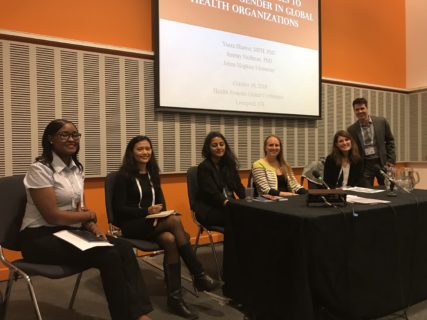Article begins

Social scientists discussing the complexity of global health policy and systems (left to right: Edna Bosire, Annisa Rahmalia, Veena Sriram, Sara Fischer, Yusra Shawar, and Adam Koon). Emily Mendenhall
A small sub-field within medical anthropology has focused on the social organization, power relations, and politics of health policy and systems. This scholarship takes policymakers and health staff—at various levels of the health system—as points of ethnographic entry. This requires a somewhat different epistemological orientation than anthropologists’ usual focus on recipient populations, an orientation that works through the multiple individuals and bureaucracies that produce a culture, such as the culture of biomedicine. High-quality ethnographic work is perhaps the best way of understanding the complex systems that may impede progress in fighting disease or enable the promotion of good health.
We believe that now is the time for medical anthropologists to engage more deeply and seriously in ethnographic work on global public health systems, initiatives, and policies. Already, there is a clear gap in the knowledge and scholarship from anthropology in the new(ish) discipline of health policy and systems research (HPSR), a progressive field of global public health scholarship. This is evidenced, for instance, by the recent publication of a health policy analysis reader that highlights social science approaches to understanding healthy policy and systems. The reader cites almost no anthropologists, which is partially due to the relative dearth of anthropological scholarship in this area. The opportunity to critically investigate, theorize, and apply anthropological knowledge and lenses to a budding body of global scholarship around health and politics could not be clearer.
Last month, we participated in the Fifth Global Symposium on Health Systems Research in Liverpool, United Kingdom, from October 8–12, 2018, hosted by Health Systems Global (HSG), the Alliance for Health Policy and Systems Research, Liverpool School of Tropical Medicine, and the World Health Organization. The meeting focused on how political systems often marginalize those most in need and how health systems can potentially be a vehicle to enhance health equity and social inclusion. The website described their commitment to “advance conversations and collaborations on new ways of financing health; delivering services; and engaging the health workforce, new social and political alliances, and new applications of technologies to promote health for all.” This is the most critically engaged dialogue on global health, with the most inclusive voices of scholars, practitioners, governments, and others, that we have ever encountered at a conference. The conference is truly global, with participants from high- and low-income countries alike. Indeed, this inclusivity is what anthropological conferences should be like, but often are not. Yet, despite a few individual significant contributors, the voice of anthropologists was hardly present.

Sarah Dalglish and Judith Justice. Emily Mendenhall
A small but committed group of anthropologists have directed their attention to research on health systems, politics, and policy, marked by the publication of Judith Justice’s book, Policies, Plans, and People: Foreign Aid and Health Development (1986). This work is explicitly ethnographic and political. Nearly 25 years later, Svea Closser wrote Chasing Polio in Pakistan: Why the World’s Largest Public Health Initiative May Fail (2010)—a markedly political critique of the culture and structure of the polio eradication campaign, from the bottom up. Others have made important book-length contributions to this body of scholarship, such as Nora Kenworthy’s Mistreated:The Political Consequences of the Fight against AIDS in Lesotho (2017), as well as more clinically oriented work, such as Claire Wendland’s A Heart for the Work: Journeys through an African Medical School (2010). Further significant contributions are exemplified by other anthropologists who attended the conference, including Katerini Storeng’s work on the politics of health systems strengthening, Jennifer Palmer’s work on the politics of power and reproduction in post/conflict settings, Christopher Colvin’s work on the complexities community health workers face, and Craig Janes’s work on the politics of corporate extraction, climate, and health.

Anthropologists at the conference (left to right: Katerini Storeng, Emily Mendenhall, Isabelle Lange, Jennifer Palmer, and Edna Bosire). Emily Mendenhall
Opportunities to enhance anthropological contributions to this field were particularly clear at the Third Symposium on Global Health Policy: Advancing Health Policy Process, a one-day workshop hosted on October 8, 2018. Speakers in the opening plenary called for a more interdisciplinary and engaged body of scholarship on health systems, and indicated that we need more theory-building, voices from low- and middle-income countries, and engaged evidence. But, one panelist suggested that communicating with anthropologists is difficult because they will not hammer out their work into a neat, existing framework! Anthropologist Judith Justice, also speaking on the plenary, discussed how the field of health policy analysis has emerged and changed over time, emphasizing how an enhanced recognition of critical perspectives on health politics and policy is essential to improving health globally. Later, Svea Closser argued that the complexity that ethnographic work illuminates blurs the lines of theory and methods that other disciplines wish to keep separate. This is the most critically engaged dialogue on global health, with the most inclusive voices of scholars, practitioners, governments, and others, that we have ever encountered at a conference….Yet, despite a few individual significant contributors, the voice of anthropologists was hardly present.
A few takeaways for anthropologists who are ready to engage
1) There is a need for more ethnography focusing on the politics and power within and between those engaged in health systems and various levels of policy making and practice. Four areas of focus may include a) critical perspectives on health policy and systems; b) fine-grained illustrations of how policy becomes practice; c) ethnographic methods employed to understand the decisions and experiences of actors from policymakers to community members; and d) critical issues in global health, including issues of development, corruption, financing, and institutions. This may also include critical studies of agenda-setting, funding, research, and implementation that determine what and how conditions are prioritized.
2) It would be useful to organize within medical anthropology so that there is more thoughtful dialogue about and among this critical work on health systems and policy. This would help anthropologists contribute more robustly to this area of scholarship, which takes institutions and systems, as opposed to vulnerable groups or clinical populations, as its object of study.
3) We need more anthropological contributions in various venues for this type of ethnographic scholarship on the health policy process. In this regard, we are soliciting manuscripts for a new book series and also encourage publishing this ethnographic work in interdisciplinary journals, such as in Health Policy and Planning, Global Public Health, Globalization and Health, Health Affairs, International Journal of Health Policy and Management, American Journal of Public Health, Social Science and Medicine, and others.
Emily Mendenhall is associate professor of global health in the Science, Technology, and International Affairs Program in the School of Foreign Service, Georgetown University. Her current work, funded by the NIH Fogarty International Center, tests the theory of syndemics in Soweto, a neighborhood in Johannesburg, South Africa.
Svea Closser is associate professor of international health in the Program in Social and Behavioral Interventions, Bloomberg School of Public Health, Johns Hopkins University. Her current work, funded by the Fulbright/Nehru program, explores the lives and social relations of community health workers in rural Rajasthan, India.
Judith Justice is associate professor of health policy and medical anthropology at the University of California, San Francisco. Her current work continues to focus on global health policy, in addition to studies related to neglected tropical diseases (NTD), including leprosy.
Peter J. Brown is professor of anthropology, professor of global health, and senior academic advisor to the Global Health Institute at Emory University. His current work explores the cultural and political history of global anti-malaria policies.
Please send your comments and ideas for SMA Section News columns to contributing editors Dori Beeler ([email protected]) and Laura Meek ([email protected]).
Cite as: Mendenhall, Emily, Svea Closser, Judith Justice, and Peter J. Brown. 2019. “Promoting the Anthropological Perspective in Global Health Systems Scholarship.” Anthropology News website, January 11, 2019. DOI: 10.1111/AN.1247

